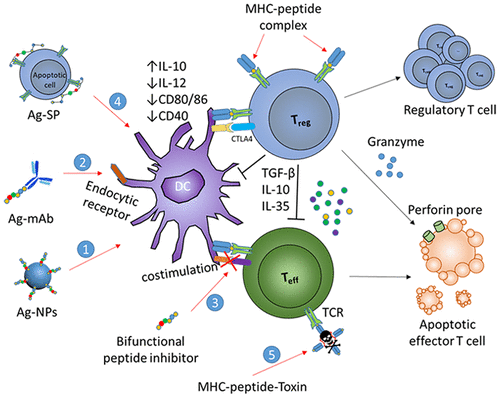当前位置:
X-MOL 学术
›
Bioconjugate Chem.
›
论文详情
Our official English website, www.x-mol.net, welcomes your
feedback! (Note: you will need to create a separate account there.)
Bioconjugate Strategies for the Induction of Antigen-Specific Tolerance in Autoimmune Diseases
Bioconjugate Chemistry ( IF 4.0 ) Pub Date : 2017-11-22 00:00:00 , DOI: 10.1021/acs.bioconjchem.7b00632 Chunsong Yu 1 , Jingchao Xi 1 , Meng Li 1 , Myunggi An 1 , Haipeng Liu 1, 2, 3
Bioconjugate Chemistry ( IF 4.0 ) Pub Date : 2017-11-22 00:00:00 , DOI: 10.1021/acs.bioconjchem.7b00632 Chunsong Yu 1 , Jingchao Xi 1 , Meng Li 1 , Myunggi An 1 , Haipeng Liu 1, 2, 3
Affiliation

|
Antigen-specific immunotherapy (ASI) holds great promise for the treatment of autoimmune diseases. In mice, administration of major histocompatibility complex (MHC) binding synthetic peptides which modulate T cell receptor (TCR) signaling under subimmunogenic conditions induces selective tolerance without suppressing the global immune responses. However, clinical translation has yielded limited success. It has become apparent that the TCR signaling pathway via synthetic peptide antigen alone is inadequate to induce an effective tolerogenic immunity in autoimmune diseases. Bioconjugate strategies combining additional immunomodulatory functions with TCR signaling can amplify the antigen-specific immune tolerance and possibly lead to the development of new treatments in autoimmune diseases. In this review, we provide a summary of recent advances in the development of bioconjugates to achieve antigen-specific immune tolerance in vivo, with the discussion focused on the underlying design principles and challenges that must be overcome to target these therapies to patients suffering from autoimmune diseases.
中文翻译:

诱导自身免疫性疾病的抗原特异性耐受的生物共轭策略。
抗原特异性免疫疗法(ASI)在治疗自身免疫性疾病方面具有广阔的前景。在小鼠中,在亚免疫原性条件下施用可调节T细胞受体(TCR)信号传导的主要组织相容性复合物(MHC)结合合成肽可诱导选择性耐受,而不会抑制整体免疫应答。但是,临床翻译取得的成功有限。显然,仅通过合成肽抗原的TCR信号传导途径不足以在自身免疫疾病中诱导有效的致耐受性免疫。结合其他免疫调节功能和TCR信号传导的生物缀合物策略可以放大抗原特异性免疫耐受性,并可能导致自身免疫性疾病新疗法的发展。在这篇评论中,在体内,讨论的重点是潜在的设计原则和挑战,这些疗法必须针对将这些疗法用于患有自身免疫性疾病的患者。
更新日期:2017-11-22
中文翻译:

诱导自身免疫性疾病的抗原特异性耐受的生物共轭策略。
抗原特异性免疫疗法(ASI)在治疗自身免疫性疾病方面具有广阔的前景。在小鼠中,在亚免疫原性条件下施用可调节T细胞受体(TCR)信号传导的主要组织相容性复合物(MHC)结合合成肽可诱导选择性耐受,而不会抑制整体免疫应答。但是,临床翻译取得的成功有限。显然,仅通过合成肽抗原的TCR信号传导途径不足以在自身免疫疾病中诱导有效的致耐受性免疫。结合其他免疫调节功能和TCR信号传导的生物缀合物策略可以放大抗原特异性免疫耐受性,并可能导致自身免疫性疾病新疗法的发展。在这篇评论中,在体内,讨论的重点是潜在的设计原则和挑战,这些疗法必须针对将这些疗法用于患有自身免疫性疾病的患者。











































 京公网安备 11010802027423号
京公网安备 11010802027423号